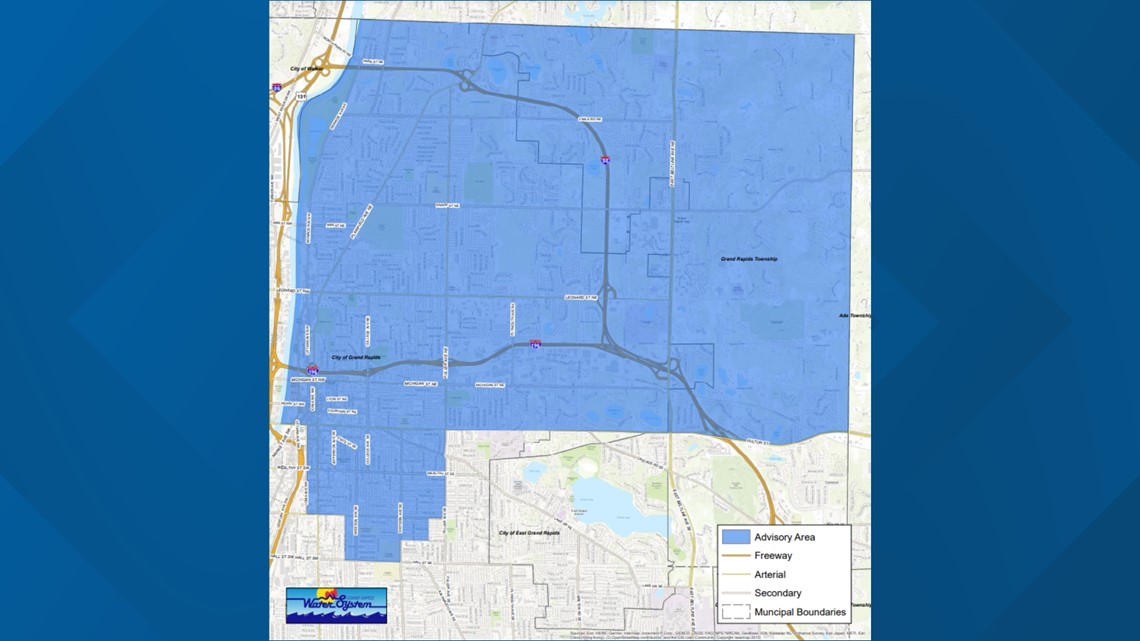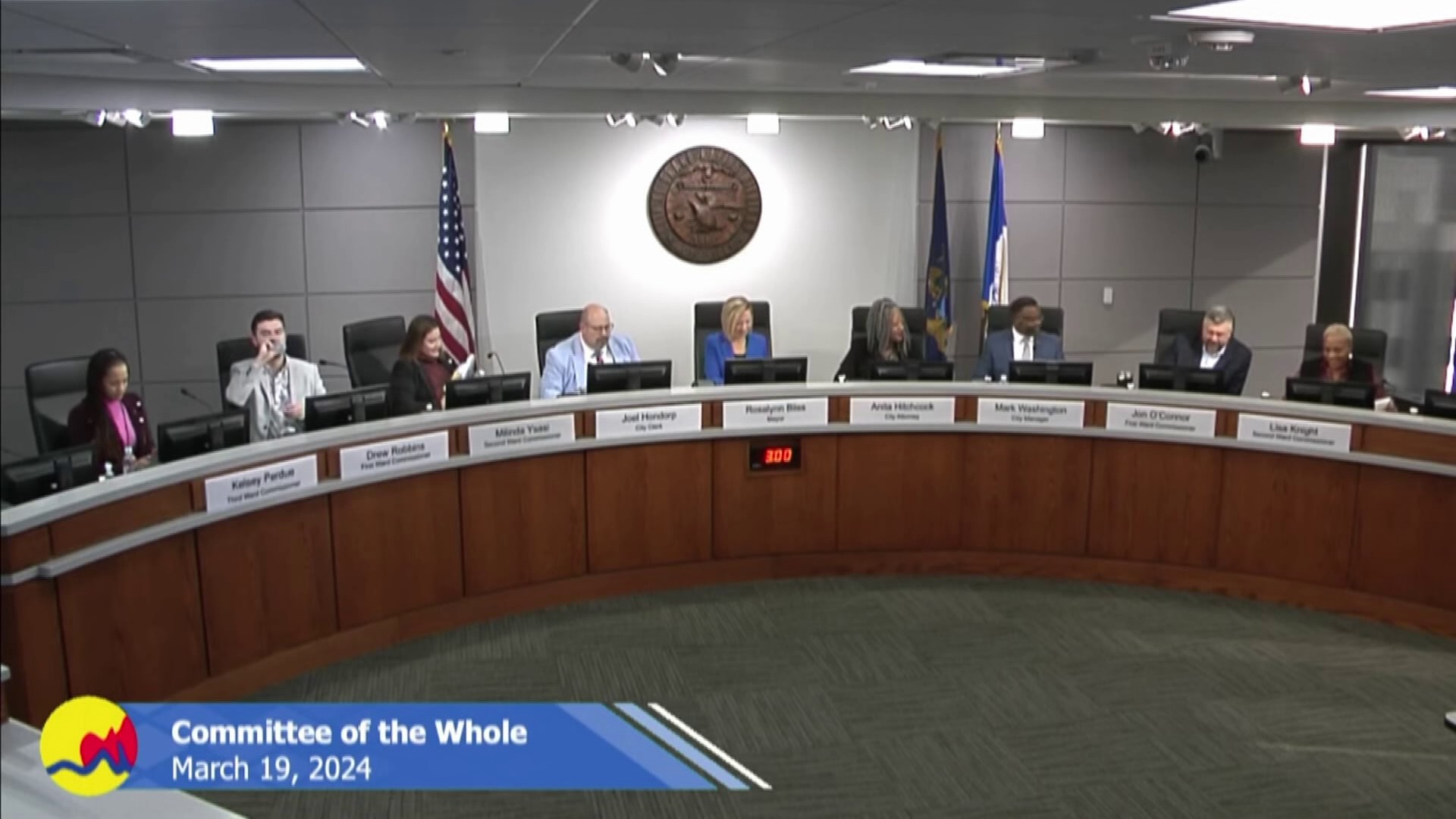GRAND RAPIDS, Mich. — UPDATE: The City of Grand Rapids announced Wednesday that the boil water advisory is lifted, but residents are encouraged to follow these next steps.
-------------------------------------------------------------------------------------------------
During a regularly scheduled City Commission meeting Tuesday, leadership addressed one of Grand Rapids residents' biggest concerns: why did a water main break impact thousands of people?
Grand Rapids City Manager Mark Washington shared a memo with his preliminary findings about Sunday's water main break and what the city is doing to correct the issue.
A 12-inch main near Carrier Creek is to blame, Washington said. That main was connected to two larger 30-inch lines on Colebrook and Leonard.
"And when the system began to depressurize, there were automatic shut-offs that occurred in areas larger than initial main break. And that's why we had such a large regional impact," Washington said. "We know this outage has disrupted the lives of community members and do apologize for the impacts that this has had on them."
The boil water advisory remains in place on Tuesday for Grand Rapids water customers East of US-131 and North of Hall Street.
You may see fire hydrants throughout the northeast side of the city pumping water as they work to flush the system.
This advisory only applies to those with city water within the impacted areas. If you use well water, you don't have to boil your water.
"I want to say thank you to all of our city staff who stepped up and have been working around the clock over these last couple of days, as well as our city leadership team and our emergency operating center, which was opened," Mayor Bliss said.
"We feel terrible about the disruptions, especially to our small businesses who weren't able to open yesterday, but I also really appreciate the community stepping up and helping out one another and helping us get through this," Mayor Bliss said. "And hopefully it will be resolved as quickly as possible."
While the first round of water testing came back negative, officials are still awaiting a second negative result. The second round is underway and is not expected to be completed by the end of Tuesday.
The final testing results are expected on Wednesday.
If both results are in the clear, city officials intend to lift the boil water advisory.
City crews and volunteers distributed more than 2,600 cases of water during Monday evening's free bottled water handout.
Any residents who are impacted by the advisory can pick up a free case of water (one case per vehicle) on Tuesday, March 19 from 8 a.m. to 8 p.m. while supplies last. The pickup location is 1635 Leonard St. NE. The city will have temporary signs and staff to direct traffic at the pickup location.
The Grand Rapids Fire Department also delivered 30 cases of water to Mel Trotter Ministries as well as Dégagé Ministries, the city manager said.
While the water department continues to look into what happened, city leadership plans to internally review the situation as well.
"In addition to the water department's internal review of the maintenance history on the main in question that broke, I've asked the city engineer to independently review systems work related to this instance and the automatic shut-offs and provide me a report of findings. Once complete, I will provide a future update on any findings associated and any associated actions. Again, today is a preliminary report on what I know at this time," Washington said.
Timeline of Water Main Break, Boil Water Advisory
"According to the data from the water department system, it appears that the earliest signs of an issue occurred around 12:30 p.m. on Sunday, March 17," Washington said.
Operators then noticed the pressure drop when the pumps at the Livington Pump Station began to shut down around 1:20 p.m. Crews couldn't start up any pumps at the station remotely because of the pressure drop, and the low pressure in the system, Washington said.
This also decreased the water pressure at several other pumping stations in the area Sunday, which eventually impacted a much broader area from where the water main break first occurred.
Starting around 1:30 p.m., the city started getting concerns from customers via 311 and other reports.
More crews were called in to troubleshoot and got the pumps turned back on around 2 p.m.
Around 2:30 p.m., staff found the exact location of the water main break and contained it by 6 p.m.
Washington said most water customers had some usable water pressure as early as 4:30 p.m.
Because of the low pressure, city officials had to issue a boil water advisory. That first boil water advisory was issued at 3:30 p.m. Sunday with the generalized impact.
Once crews finalized the location, they shared a more detailed map at 6:45 p.m. Sunday.
Where is the Grand Rapids boil water advisory in place?
The city said residents should boil their water if they live east of US-131 and north of Hall Street.
The communities impacted are the City of Grand Rapids and Grand Rapids Township.
This map shows the areas that fall under the advisory:


What is a boil water advisory?
When a boil water advisory is issued, it means there is a chance that harmful bacteria could be inside your tap water. This could be due to a water main break, equipment failure, insufficient disinfectant or other issues.
An advisory is issued so residents can take steps to protect their health.
What do I need to do under a boil water advisory?
Until the boil water advisory is lifted, you should boil any water you plan to use for drinking, brushing your teeth, cooking and washing your dishes.
Let the water hit a rolling boil for at least one minute and let it cool before using. Boiling the water kills bacteria and other organisms in the water that could be harmful.
You can use tap water for washing your hands, doing laundry and bathing, although you should be careful not to swallow any of the water.
Boiled or bottled water should be used for drinking, making ice, brushing teeth, washing dishes and food preparation. It should also be given to pets instead of tap water.
You can run the dishwasher under a boil water advisory if the water reaches a final rinse temperature of at least 150 degrees Fahrenheit or it has a sanitizing cycle.
Even if your fridge has a water filter, you should still boil the water and cool it before consuming it.
How to get free water
The City of Grand Rapids and SpartanNash are teaming up to provide water to people affected by the city's boil water notice.
Any residents who are impacted by the advisory can pick up a free case of water (one case per vehicle) on Tuesday, March 19 from 8 a.m. to 8 p.m. while supplies last.
The pickup location is 1635 Leonard St. NE. The city will have temporary signs and staff to direct traffic at the pickup location.
Water distribution continues on Wednesday at a different location.
The City will provide one case of water per vehicle courtesy of SpartanNash from 8 a.m. to 1 p.m. on March 20 while supplies last.
Drivers are asked to go to the Huff Park baseball field parking lot at 2399 Ball Ave NE. Traffic patterns in the area will be adjusted to accommodate the distribution so please be patient and follow staff instructions and temporary signs.
What if I drank tap water without boiling it first?
The Centers for Disease Control and Prevention (CDC) said most people who drink tap water under a boil water advisory will not get sick, but that the symptoms are similar to food poisoning.
If you experience nausea, diarrhea, cramps, and possibly a mild fever after drinking tap water, you're encouraged to stay hydrated and contact a healthcare provider if symptoms worsen.
Will we get a credit for the boil water advisory?
13 ON YOUR SIDE reached out to the City of Grand Rapids to see if customers impacted by the low-pressure issues and boil water advisory would receive any credit:
"No, while we understand the inconvenience the boil notice has caused, at this time customers are receiving water service."
►Make it easy to keep up to date with more stories like this. Download the 13 ON YOUR SIDE app now.
Have a news tip? Email news@13onyourside.com, visit our Facebook page or Twitter. Subscribe to our YouTube channel.
Watch 13 ON YOUR SIDE for free on Roku, Amazon Fire TV Stick, Apple TV and on your phone.

